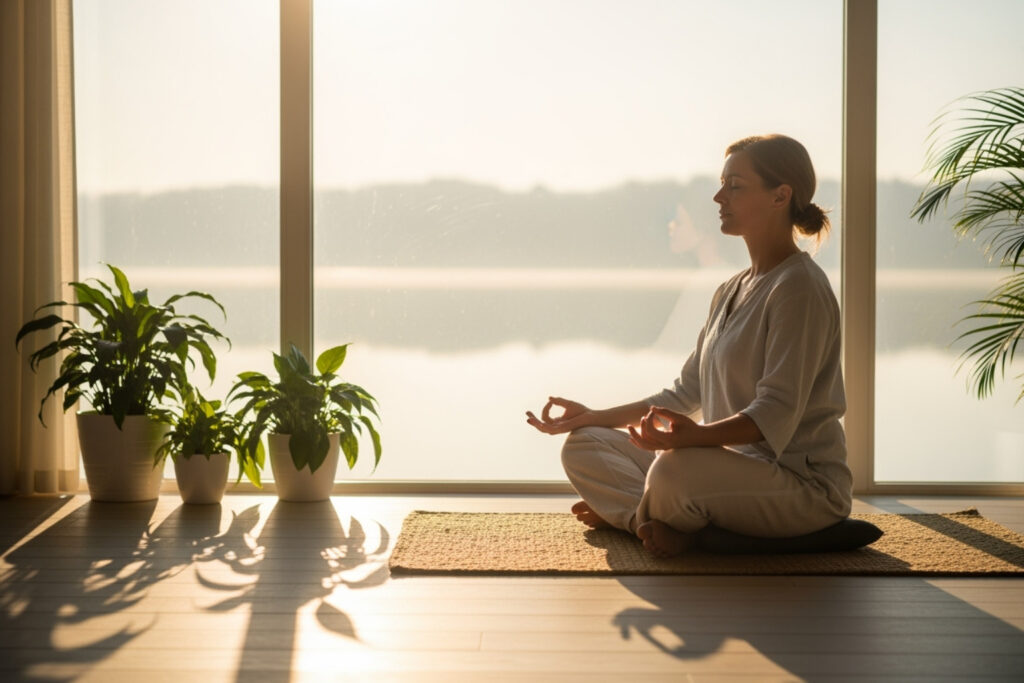Why Self-Care Activities Are Essential for Your Well-Being
Self care activities are intentional practices that maintain your physical, mental, and emotional health. They support your overall well-being and help you manage daily stress more effectively.
Essential Self-Care Activities by Category:
- Physical: Regular sleep, healthy eating, exercise
- Mental: Meditation, journaling, digital detox
- Emotional: Setting boundaries, self-compassion, seeking support
- Social: Connecting with loved ones, volunteering
- Environmental: Decluttering, spending time in nature
- Spiritual: Identifying values, reflection
- Recreational: Hobbies, play, creative pursuits
Research shows that even small acts of self-care have a big impact. Devoting just 5 minutes daily to these rituals can improve focus, boost energy, and foster a healthier work-life balance.
Self-care isn’t selfish-it’s necessary for reducing stress, preventing burnout, and building resilience. Whether managing daily demands or specific health challenges, self-care activities provide crucial support.
The key is finding activities that work for you. Self-care is personal, and consistency is what matters most.
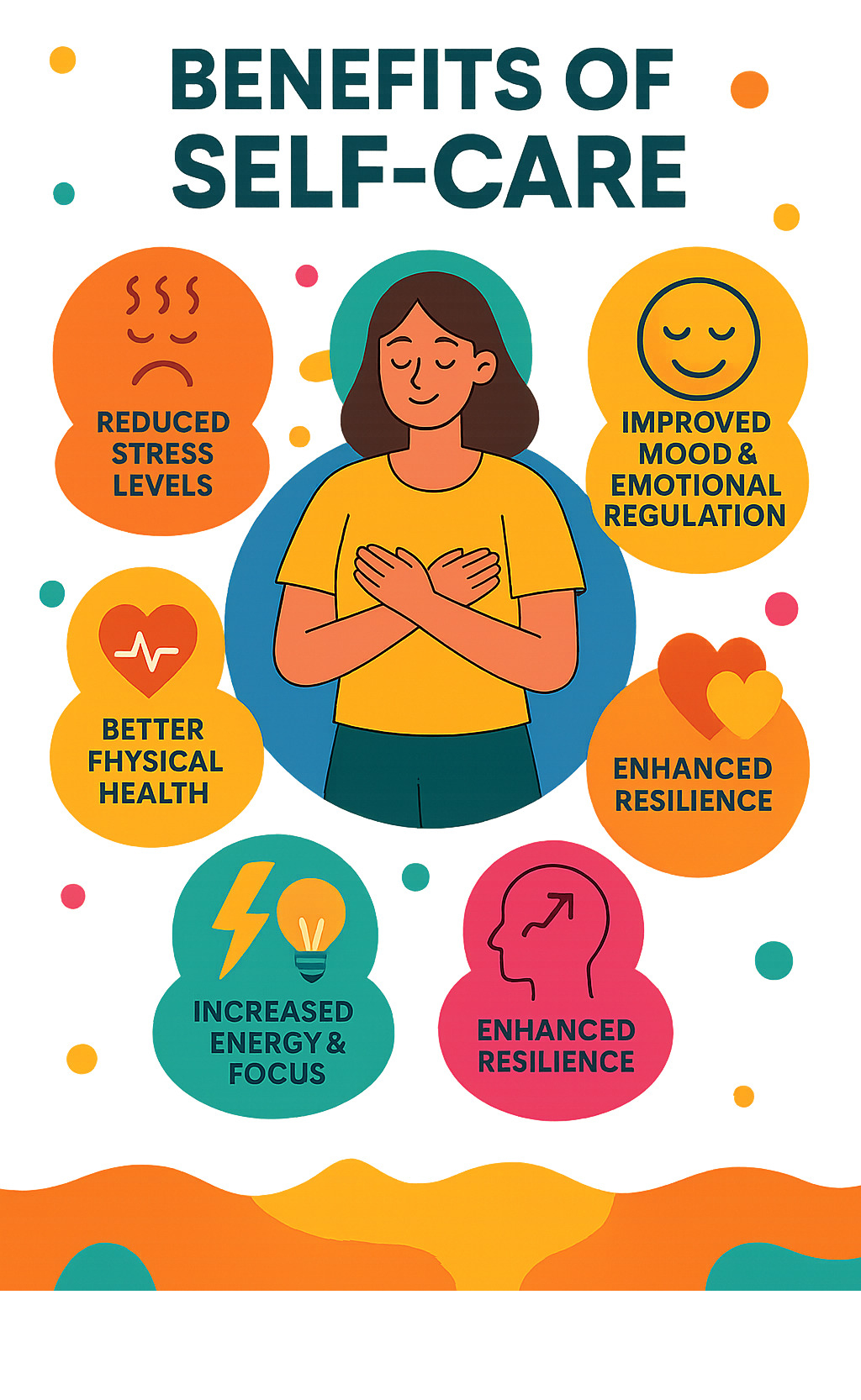
Self care activities vocab explained:
Understanding the Pillars of Self-Care
Think of self care activities as the foundation for your well-being. Holistic wellness recognizes that different aspects of our health are deeply connected. When you nurture one area, you strengthen the others. This interconnectedness is why a comprehensive approach to self-care is so powerful.
- Mental self-care keeps your mind sharp by managing mental clutter and feeding your curiosity through activities like meditation or learning something new.
- Emotional self-care involves acknowledging your feelings without judgment, developing healthy coping skills, and practicing self-compassion.
- Physical self-care honors your body’s needs through nourishing meals, restful sleep, and movement that makes you feel alive.
- Environmental self-care is about creating spaces that support your peace and productivity, like decluttering your room or adding plants.
- Spiritual self-care connects you with your values and sense of meaning, whether through prayer, time in nature, or quiet reflection.
- Recreational self-care is about pure joy through play, hobbies, and activities that light you up. Research links hobbies to better mental health and lower depression rates.
- Social self-care nurtures your connections with others by building meaningful bonds and maintaining healthy boundaries.
Understanding these seven pillars provides a roadmap for your ultimate guide to wellness and well-being. Small, consistent steps in each area create lasting change.
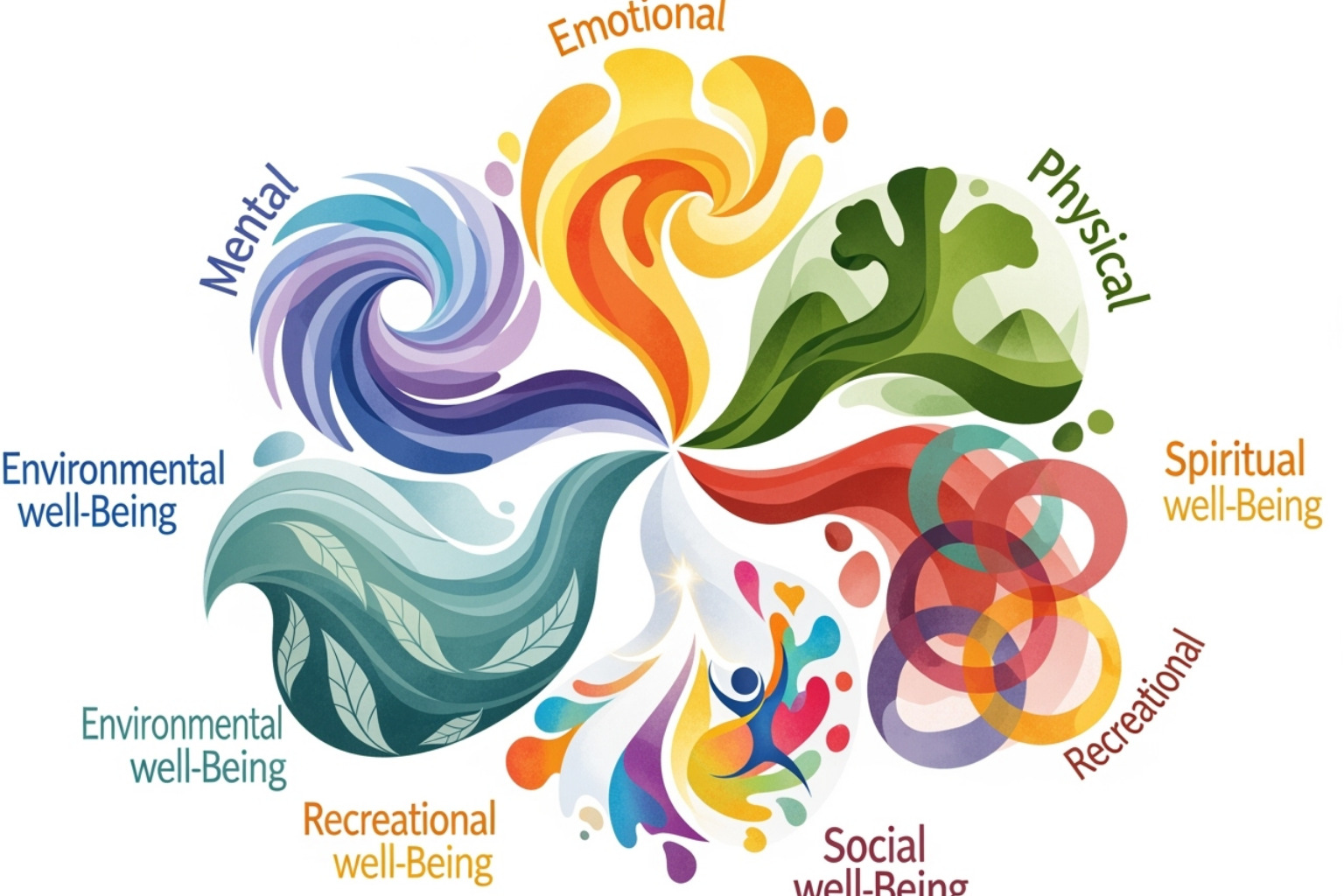
The Ultimate List of Self-Care Activities
Now that we understand the pillars, let’s dive into practical self care activities for your daily life. The best activities are those that resonate with you, so it may take some trial and error to find what works.
Physical Self-Care Activities
Taking care of our bodies is fundamental to our overall well-being. These activities nurture our physical health, which supports our mental and emotional states.
- Prioritize Sleep: Aim for a consistent sleep schedule. Make your bedroom a dark, cool, screen-free sanctuary for better restoration.
- Nourish Your Body: Eat healthy, regular meals and stay hydrated to support your energy levels and mood.
- Move Your Body: Regular exercise, like a 30-minute daily walk, relieves stress and boosts mood. Research shows it improves sleep and overall health.
- Stretch Regularly: Incorporate simple stretches to alleviate muscle tension and improve flexibility.
- Hydrate Often: Drink plenty of water throughout the day.
- Take Naps: A short nap can significantly improve energy and focus when your body needs it.
- Enjoy a Warm Bath or Shower: A soothing bath or shower can help you unwind. Add Epsom salts or essential oils for an improved experience.
- Practice Mindful Hygiene: Turn daily routines like brushing your teeth into mindful moments.
- Treat Yourself to a Massage: Release muscle tension with a professional or self-massage for deep restoration.
For more ideas, explore healthy practices for your mind and body or create a mindful beauty evening ritual or morning wellness routine.
Mental & Intellectual Self-Care
Our minds need care and stimulation. These activities help manage thoughts, reduce mental clutter, and keep our brains engaged.
- Practice Mindfulness: Anchor yourself in the present by noticing your five senses. This practice activates your “rest and digest” mode, lowering cortisol and building resilience.
- Meditate: Even 2-5 minutes of meditation can clear your mind and reduce stress.
- Journal Your Thoughts: Writing down feelings or a “brain dump” helps organize your mind and process emotions.
- Read a Book: Reading for pleasure keeps your mind active and offers a wonderful escape.
- Digital Detox: Take intentional breaks from screens to replenish attention, motivation, and creativity.
- Practice Gratitude: Write down three things you’re grateful for daily to shift your perspective toward positivity.
- Engage in Positive Self-Talk: Replace self-critical thoughts with compassionate ones, as you would for a friend.
- Learn Something New: Take a class or explore a new topic to improve brain neuroplasticity.
- Solve Puzzles: Challenge your mind with crosswords, Sudoku, or jigsaw puzzles.
- Listen to a Guided Imagery Exercise: Relax and visualize peaceful scenarios with a guided imagery exercise.
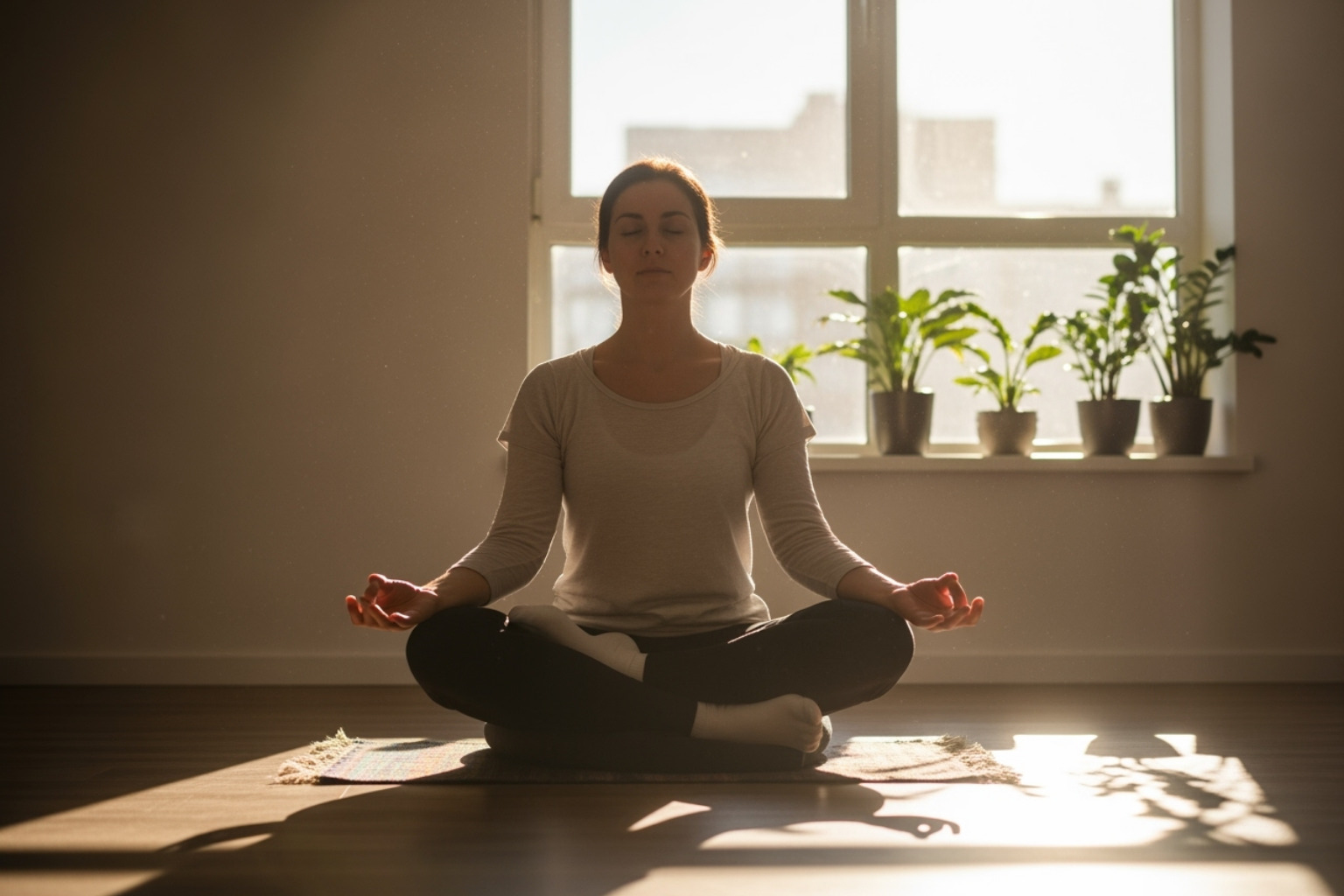
Emotional Self-Care
Managing our emotions is a vital part of self-care. These activities help us connect with our feelings and build emotional resilience.
- Practice Self-Compassion: Treat yourself with kindness, especially when facing challenges.
- Set Healthy Boundaries: Learn to say “no” to protect your energy, time, and emotional space.
- Develop Healthy Coping Strategies: Find constructive ways to deal with emotions, like talking to a friend or journaling.
- Watch Your Favorite Movie or Show: A comforting story can provide a needed emotional release or distraction.
- Listen to Music: Create a playlist that uplifts you, calms you, or helps you process feelings.
- Acknowledge Your Feelings: Give yourself permission to feel any emotion without judgment.
- Seek Support: Ask for help from friends, family, or a professional when you need it. This is vital for emotional health and overall beauty and mental health.
- Engage in Creative Expression: Doodling, writing, or any creative outlet can be a powerful way to express emotions, boost dopamine, and reduce anxiety.
Social Self-Care Activities
Humans thrive on connection. Social self-care involves nurturing relationships and combating loneliness.
- Connect with Friends and Family: Schedule regular time with people who uplift you. Research shows this is a key determinant of happiness.
- Volunteer: Giving back to your community can create a sense of purpose and connection.
- Join a Club or Group: Find a community around shared interests like a book club or hiking group.
- Ask for Help: Reaching out to your support system is a sign of strength.
- Engage in Meaningful Conversations: Move beyond small talk to truly connect with others.
- Play a Board Game with Others: Gather friends or family for a fun, interactive activity.
- Write a Letter to a Friend: A handwritten letter is a uniquely personal way to connect.
- Practice Community Self-Care: Uplift others, recognizing that our well-being is interconnected.
- Spend Time with Your Pet: Cuddling a pet can reduce stress and promote feelings of safety.
Social connection is important for our mental and emotional needs. SAMHSA offers tips for connecting with others for support.
Spiritual, Recreational, & Environmental Self-Care
These pillars cover our connection to something larger, our need for joy, and the impact of our surroundings.
- Spend Time in Nature: Walk in a park or hike a trail. Nature is proven to lower cortisol and improve mood. You can rent tents and other gear or join outdoor adventure trips.
- Identify Your Personal Values: Reflect on what matters to you and align your actions with those values for a deeper sense of meaning.
- Engage in Hobbies: Dedicate time to activities you enjoy. Hobbies are linked to better mental health and lower depression.
- Play: Revisit a childhood joy, like blowing bubbles to slow your breathing, or simply let loose and have fun.
- Declutter Your Space: Organizing your environment can reduce cognitive overload and promote mental clarity.
- Create a Cozy Home Environment: Add plants, light a candle, or arrange your space to be more inviting. This is part of eco-friendly wellness and personal development and self-care.
- Visit a New Place: Explore a new park, museum, or neighborhood to stimulate your mind.
- Appeal to Your Senses: Light a scented candle, listen to calming sounds, or enjoy a soft blanket.
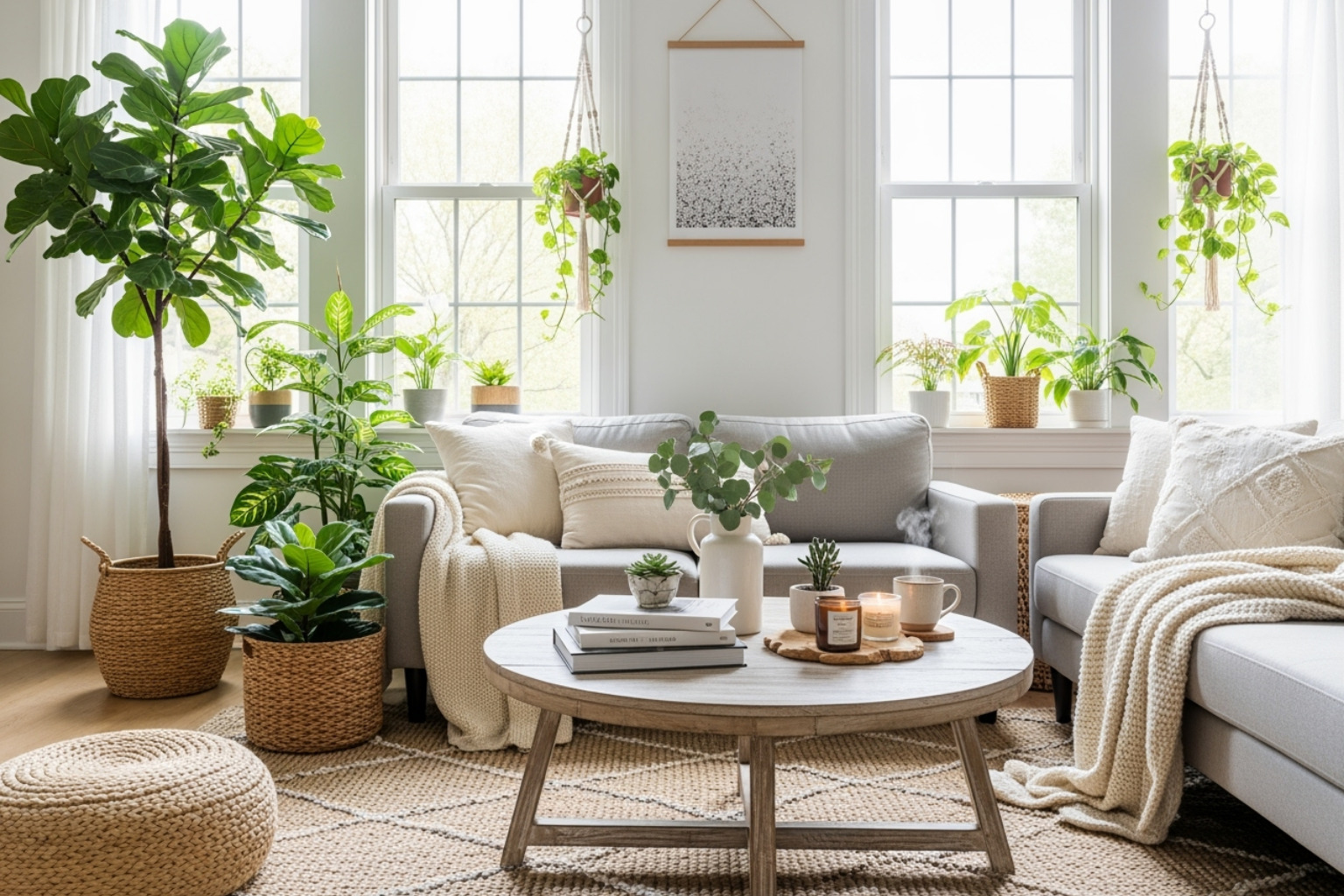
Making Self-Care Work For You
Effective self care activities don’t have to be complicated or time-consuming. What matters is finding practices that resonate with you and realistically fit into your life. Think of it as a personal experiment to find what makes you feel better.
How to Create a Personalized Self-Care Plan
Your self-care plan should be uniquely yours. Start by finding what you enjoy from the activities we’ve explored. There’s no right or wrong choice-only what works for you.
Trial and error is an essential part of the process. The key is to start small with one or two manageable activities. Even 5 minutes a day can make a meaningful difference.
A fun approach is a self-care jar: write activities on slips of paper and draw one when you need inspiration. You can even color-code them by self-care pillar.
Most importantly, align your choices with your personal values. If you value growth, lean into mental practices. If connection is key, prioritize social activities. Listen to your body and mind-they will often tell you what kind of care you need.
For more guidance, explore our Self-Care Guide.
Fitting Self-Care into a Busy Schedule
Self-care isn’t about finding extra time; it’s about being intentional with the time you have.
- Micro-breaks are game-changers. Use the few minutes while coffee brews for deep breathing or a quick stretch.
- 5-minute wellness practices are accessible to everyone. Our 5-Minute Wellness Tips for Busy Women offers practical ideas.
- Time blocking self-care in your calendar transforms it from an afterthought into a priority.
- Combining activities allows you to multitask mindfully. Listen to a podcast while doing chores or practice gratitude during your commute.
- Shifting your perspective can turn ordinary moments, like your skincare routine, into self care activities.
Adapting Self-Care for Different Life Stages
Your self-care needs will evolve with your life. What serves you in one season may need adjustment in the next.
- College students can manage academic stress with study breaks, social connection, and healthy sleep and eating habits.
- Caregivers often put others first, risking burnout. Self-care might mean accepting help, taking short breaks, or connecting with other caregivers. Taking care of yourself is essential to care for others. Caregiver Support offers additional resources.
- Working professionals juggling career and personal life can benefit from setting clear boundaries, taking real breaks, and decompressing after work to maintain work-life balance.
Self-care is flexible. As your life changes, your practices can adapt. The commitment to caring for yourself is what matters most.
When Self-Care Isn’t Enough: Seeking Professional Help
While self care activities are powerful, they are not a substitute for professional medical or mental health care. Think of self-care as daily maintenance; sometimes, you need a professional. Recognizing when you need support is a vital act of self-care.
Recognizing the Signs
It’s time to reach out if you experience persistent symptoms that last for two weeks or more and interfere with your daily life. Key indicators include:
- Overwhelming sadness, hopelessness, or anxiety.
- Significant changes in sleep or appetite.
- Loss of interest in activities you once enjoyed.
- Difficulty concentrating or completing daily tasks.
- Persistent irritability, frustration, or restlessness.
If you have thoughts of self-harm or suicide, seek immediate professional help. These thoughts are serious and require immediate attention.
How to Find Help
Reaching out can feel daunting, but several pathways can help.
- Your primary care provider is an excellent first step. They can rule out physical causes and provide referrals to mental health specialists.
- Mental health professionals like therapists and counselors are trained to help. The Substance Abuse and Mental Health Services Administration (SAMHSA) offers resources for locating mental health services in your area.
- For immediate crisis support, the 988 Suicide & Crisis Lifeline is available 24/7. Call or text 988 for free, confidential support from trained counselors.
Seeking professional help is a sign of wisdom and self-awareness. For more resources, explore our guide on mental health and wellness.
Frequently Asked Questions about Self-Care
Here are answers to some of the most common questions about building a self-care practice.
Why is self-care so important for mental health?
Regular self care activities provide the tools to manage life’s challenges. The key benefits include:
- Stress reduction: Activities like deep breathing lower cortisol levels and activate your body’s “rest and digest” mode.
- Anxiety management: Simple practices like meditation or listening to music can calm your nervous system.
- Resilience building: Consistent self-care strengthens your ability to bounce back from adversity.
- Burnout prevention: Regularly recharging your mental and emotional batteries prevents exhaustion.
- Mood boosting: Hobbies and social connection release feel-good chemicals like dopamine and oxytocin, which are linked to better mental health.
How do I start a self-care routine if I have no time?
You don’t need large blocks of time for self-care to be effective. The key is to start small and be consistent.
- Use micro-habits: Start with just 5 minutes a day. This could be a quick stretch, mindful breathing, or listening to one favorite song. Research shows even 5 minutes daily can improve focus and energy.
- Integrate into existing routines: Weave self-care into what you already do. Listen to a podcast on your commute or practice gratitude while brushing your teeth.
- Schedule it: Put self-care in your calendar like any other appointment to make it a non-negotiable priority.
- Shift your perspective: View self-care as an investment that makes you more effective and energized in all other areas of your life.
What’s the difference between self-care and self-indulgence?
The difference lies in intention and long-term outcomes.
Self-care is about nurturing yourself to support your long-term well-being. It meets your fundamental needs so you can be healthy and resilient. Sometimes it’s not immediately pleasurable, like setting a difficult boundary, but the outcome is positive.
Self-indulgence is driven by immediate gratification, often to numb or avoid discomfort. While it might feel good in the moment (like binge-watching TV to avoid stress), it can lead to negative consequences like guilt or unaddressed problems.
True self-care fills your cup so you can pour into other areas of your life. It’s about creating healthy habits for long-term flourishing, not just momentary comfort.
Conclusion
We’ve explored how self care activities-from physical to social-are simple yet powerful practices that offer a pathway to greater well-being. The most important takeaway is that self-care is not a luxury; it’s essential for managing stress, preventing burnout, and building resilience.
Your self-care journey is uniquely yours. The beauty lies in the exploration and finding what truly restores you. Consistency with small acts matters more than perfection. A 5-minute stretch, a mindful cup of tea, or a call to a friend can create ripples of positive change.
At Beyond Beauty Lab, we believe nurturing your well-being is the foundation of true beauty. When you care for your mind, body, and spirit, an inner glow radiates outward.
We encourage you to start today. Choose one self care activity from our list that speaks to you. Trust that this single, intentional act is a step toward a happier, healthier you.
Explore our complete guide to a wellness lifestyle and continue your journey toward holistic well-being with us.

